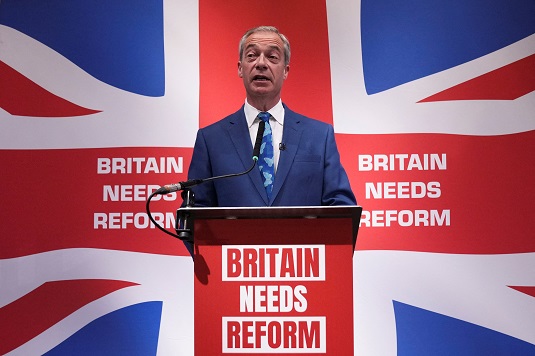
One doesn't have to like his politics or even like Farage to understand his appeal. He's a million miles away from the dead-eyed briefcases that pass for most mainstream MPs. His "you-can't-say-that" use of right wing talking points appear to come from an authentic place, simply because Reform's owner/leader can speak for as long as he likes coherently, without prompts, and not without humour. It's this peculiar charisma that struck a chord with some men of a certain age, and has beguiled many a journalist. Farage's politics are as reactionary as they are boring. But our Nige most assuredly is not, and it's that kind of star quality that is missing from the Tory line up. And that is a problem. For right wing voters hungering for an authoritarian figure, no-knack Sunak doesn't measure up.
In the questions, Farage gave the impression that Reform weren't likely to win any seats. And he's probably right. Clacton, which is held by the anonymous right winger Giles Watling (who is more famous for playing a character in Carla Lane's Bread over 30 years ago, which says it all) has an enormous cushion of votes under his backside. It's unlikely Farage can overturn such a majority, even with Labour winning over Tory voters with the Lib Dems and the Greens tearing out their share here in there. But the danger comes in those marginal seats which, given the state of the polls, could include any constituency where the Tory incumbent has a majority lower than 15,000 votes. Reform could easily make a difference and tip dozens more seats into Labour and Liberal Democrat gains. What a terrible shame.
How are the Tories meeting the threat of Reform? As it stands, their campaign so far has been entirely about shoring up the core vote. Whether it's peddling national service (which appears to account for losing support, according to the latest survey from JL Partners) or cranking up the fear factor, none of it is shifting the polls in their direction, nor is it warding off Reform's menaces. Now that Farage is in play and can use his standing to win over more Tory voters and lure others out on election day, where does the Conservative campaign go? Sunak has decided there's no place like the gutter, and is banging the ECHR drum again in the hope that the promise to do Brexit for a second time will appeal. You don't need to be terribly astute to realise that it won't.
The problems the Tories have is that to the mind of the Reform-minded voter, Farage's tales of Brexit betrayal ring true. They were promised frictionless trade with Europe, a clampdown on immigration, the spending of monies saved on decaying coastal towns and the country outside of the South East. And, of course, the £350m/week for the NHS. Leave campaigners said the cost of living would come down and, to borrow a recent Tory party phrase, the economy would be going "gang busters" free from the sclerotic weight of a decaying EU. None of this has happened. The reason why is because Brexit was a pie-in-the-sky project that suited the interests of a section of British capital, but no one likes to be taken for a mug. And so there's mileage in Farage's argument that Brexit has been mishandled and the opportunities binned because the Tories are Marxists in hock to leftist ideology, or some such rubbish. Therefore, because the Tories are choosing to fight on this ground they are doomed to lose a bidding war with Farage. The result is a split vote and the kind of election result even I didn't contemplate in my more excitable moments writing the book.
But does Farage's return also pose a threat to Labour? The idiot's scribe Tom Harris thinks so, though his argument is perhaps the most stupid comment I've seen on the election so far. Apparently Labour voters might be tempted because excitement. No, Keir Starmer doesn't have to be worried about opposition coming from the right for a while. But if he plays the immigration bad/anti woke politics game, and there's nothing in his speeches on immigration to say he won't, he's throwing Farage a lifeline that will keep him politically relevant long after the Tories are taken out and he fails to win for the eighth time running. In cultivating scapegoats of Labour's own, he also runs the risk of a war with Reform that Labour cannot win. Especially as it would speed up the disintegration of his own base which, to be honest, isn't in rude health - despite what the polls say.
As for Reform itself, does it have much of a future? Not really. As with UKIP before it, because of the character of its support it has all the declinist features of Tory support in extremis. But it doesn't need longevity. Farage's purpose - openly stated - is to pressure UK politics from the right and swing it toward his brand of authoritarian politics before realities catch up with its obsolescence. If by doing so he's able to hold back the struggle for a green transition, the final victory of socially liberal attitudes, and stymie the ascendency of the new class politics, that means a longer period in the spotlight and more cash for a gilded retirement. Reform, after all, is a business and the purpose of a business is to return a profit to its owner.
Image Credit
No comments:
Post a Comment